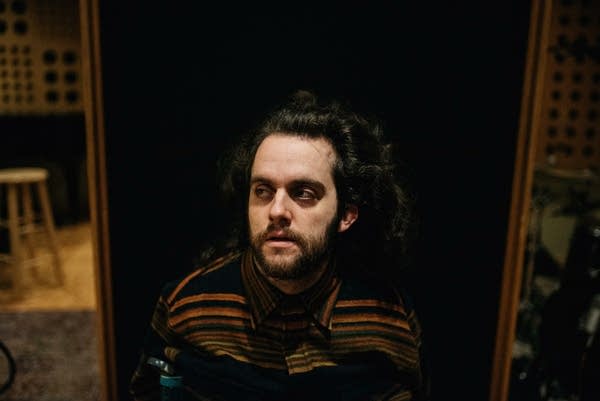‘Dirt folk’ hero: Freaque shines a light on darkness
by Lydia Moran
August 29, 2019

On Freaque's debut EP Decompose, Gabriel Roderick's voice is mixed so that if you close your eyes, you might imagine that he is sitting right beside you. Say, on a porch swing just after dusk as bats swing low in the sky. You look over a wide expanse of field, and he gestures to things in the distance — a puppet with cut strings, a house in the sky, a family digging graves. As he sings, more of the slowly darkening landscape reveals itself, and a breeze elicits sinister guitar licks and harmonica riffs. After some time, a musical saw quiver pierces the air, and blackness envelopes the field at last.
Gabriel Rodreick grew up playing the piano in his south Minneapolis home — for eleven years, he told me, until a C5 spinal injury he incurred a little over eleven years ago paralyzed him from the armpits down and severely limited the mobility in his hands. Three years post-injury, he entered the music world again, singing in the seven-piece funk band Treading North. A little over a year ago, Rodreick found a way to return to the instrument he grew up playing: by using the eraser of a pencil affixed to his wrist brace.
As Freaque, the moniker for his solo work, Rodreick explained that he's making the kind of music he's always aspired to make: a kind of stripped-down folk, centered on storytelling, and sensitive to the darker side of human experience. It's a sound he's coined "dirt folk." "Post-injury, I tend towards darkness," Roreick said, after citing Tom Waits as a major influence. "Not in a depressive or negative way — I try to shine a little light on the darkness; it's always there, and it's within all of us."
On Decompose, Rodreick's voice is noticeably deeper and more gravelly than on those Treading North recordings. He uses it to weave stories that underscore the complexities and paradoxes that exist within darkness, anger, sadness, and loss. On the EP's longest track, "House Song," Rodreick takes listeners on a winding journey through a house. He illuminates components of its uncanny interior one by one: a chimney that leans when the wind blows, a basement that smells like piss, and stairs that only go down. Rodreick sings on the chorus: "My home is stolen/ My house is robbed." In the song, the house is both gone and home; deteriorating, yet built like that on purpose. It's a atmospheric, lonesome track complete with mournful harmonica riffs (courtesy of Lightin' Joe Peterson), but the darkness that resides there is not cut and dry, and what is lost remains.
On "Broken Puppet," he addresses a puppet with its strings cut. Although the toy is ostensibly "broken," its eyes begin to glow in the song, and it's able to move without a controller. "Will you tell me how you bleed on your own?" Rodreick wonders. "Feel on your own, be on your own." The puppet, though defective, eerie, and discarded, takes on new life in the darkness.
Folk musician Lena Elizabeth, who happens to be Rodreick's cousin and frequent collaborator, noted that both of their lyrics share a proclivity towards strong narratives and symbolism. "He's always trying to say something with his lyrics," she said. "He's always trying to shed light on something with each of his songs."
For Rodreick, dirt, darkness and decomposing things have a positive creative force. "We as a society need to be able to decompose," he explained. "We need to adapt to what's happening around us and let our own personal ideologies die, and we need to be asking questions and shifting how we're thinking and interacting with the world." The name Freaque reclaims a set of beliefs our society needs to let die, he said, as evident in the "freak shows" of the 20th century, wherein people with bodies outside of societal standards were put on display.
Last month, Rodreick was awarded a grant from the Cedar Cultural Center and the Jerome Foundation (fellow recipients include Dua Saleh) to compose 30 minutes of music that will debut at the Cedar in 2020. In addition to making music and touring more in the future, Rodreick said he plans on expanding his artistic repertoire with additional multifaceted performances. In December 2018, he debuted A Cripple's Dance (also at the Cedar), in which he explored movement within his body post-injury along with able-bodied dancers and dancers with restricted movements.
This Saturday, Aug. 30, Freaque will perform at the Cedar as part of Mother Goose's Bedtime Stories anniversary celebration.

